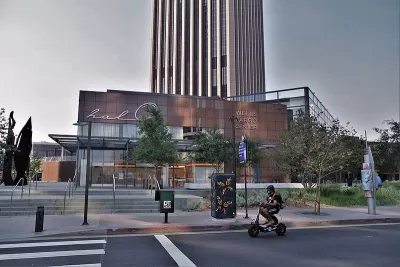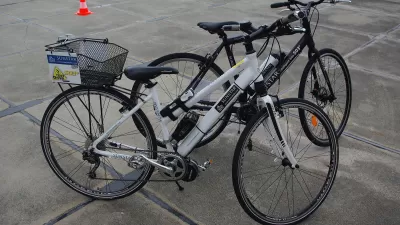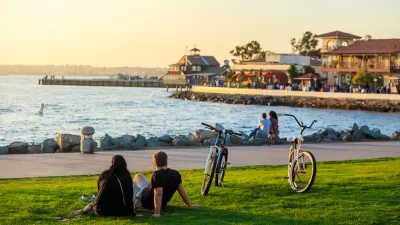A new e-bike credit, if coupled with improved bike safety infrastructure, could encourage many Americans to replace short car trips with e-bike rides, reducing emissions and congestion.

In an article for Streetsblog, John Stout writes that "it’s clearer than ever that we need to do everything in our power to mitigate our country’s impact on the climate crisis," and e-bikes may be one powerful tool for doing so. And, as it turns out, they're getting some support in the bipartisan infrastructure package and budget reconciliation.
"In a nod to the nascent American 'bike boom,' which saw e-bike sales triple in 2020, as COVID-19 lockdowns forced many to stay home and those still commuting to grow weary of using public transit, the multi-trillion dollar Build Back Better legislation includes a whopping $7.4 billion measure for e-bikes," translating into as much as $750 in credits for e-bike purchases.
But while "making e-bikes more affordable is key to increasing adoption, many would-be riders are still too fearful to take to the streets on two wheels because of safety concerns on our country’s car-centered roadways." The infrastructure legislation takes this into account and "would push federal regulators to better account for the safety of not only drivers, but also cyclists and pedestrians."
Stout argues that "if we provide Americans with the right tools, we can make biking a viable option by making it easier for people to replace shorter car trips with bike trips." But Congress must take action to "rally behind the bipartisan infrastructure and reconciliation legislation. By passing these two historic climate bills, the federal government can ensure that cyclists can ride safely on our roadways and ensure that all Americans can afford new road-ready e-bikes."
FULL STORY: OPINION: E-bikes Could Become a Weapon Against Climate Change

Maui's Vacation Rental Debate Turns Ugly
Verbal attacks, misinformation campaigns and fistfights plague a high-stakes debate to convert thousands of vacation rentals into long-term housing.

Planetizen Federal Action Tracker
A weekly monitor of how Trump’s orders and actions are impacting planners and planning in America.

In Urban Planning, AI Prompting Could be the New Design Thinking
Creativity has long been key to great urban design. What if we see AI as our new creative partner?

Cal Fire Chatbot Fails to Answer Basic Questions
An AI chatbot designed to provide information about wildfires can’t answer questions about evacuation orders, among other problems.

What Happens if Trump Kills Section 8?
The Trump admin aims to slash federal rental aid by nearly half and shift distribution to states. Experts warn this could spike homelessness and destabilize communities nationwide.

Sean Duffy Targets Rainbow Crosswalks in Road Safety Efforts
Despite evidence that colorful crosswalks actually improve intersection safety — and the lack of almost any crosswalks at all on the nation’s most dangerous arterial roads — U.S. Transportation Secretary Duffy is calling on states to remove them.
Urban Design for Planners 1: Software Tools
This six-course series explores essential urban design concepts using open source software and equips planners with the tools they need to participate fully in the urban design process.
Planning for Universal Design
Learn the tools for implementing Universal Design in planning regulations.
Appalachian Highlands Housing Partners
Gallatin County Department of Planning & Community Development
Heyer Gruel & Associates PA
Mpact (founded as Rail~Volution)
City of Camden Redevelopment Agency
City of Astoria
City of Portland
City of Laramie





























